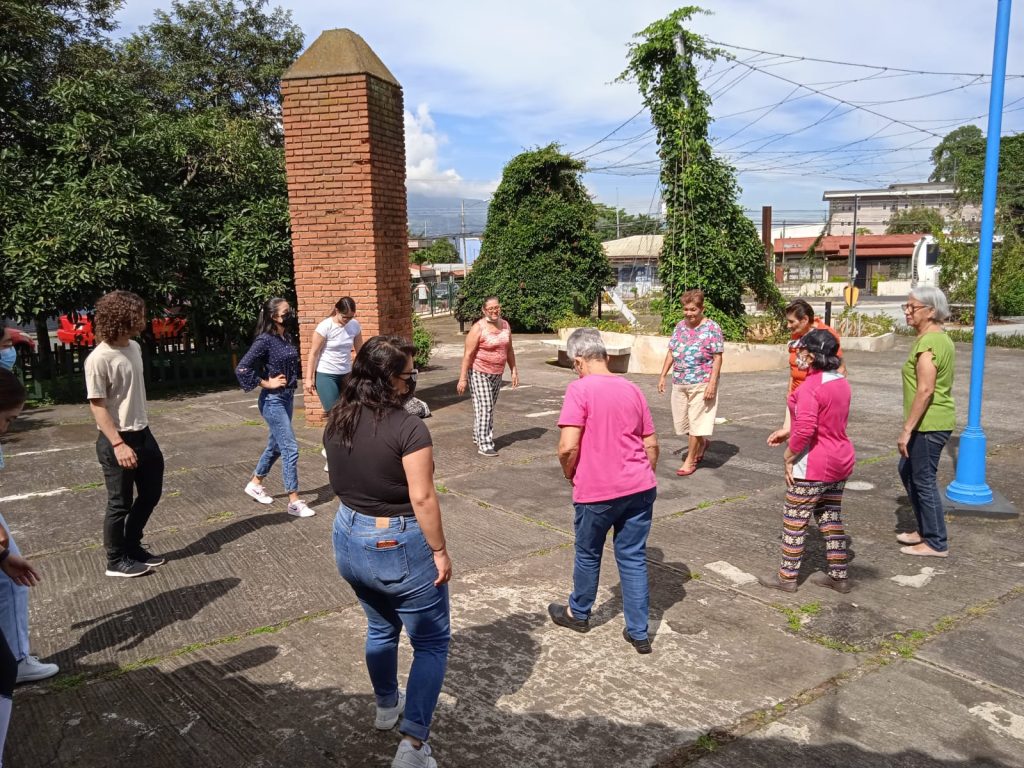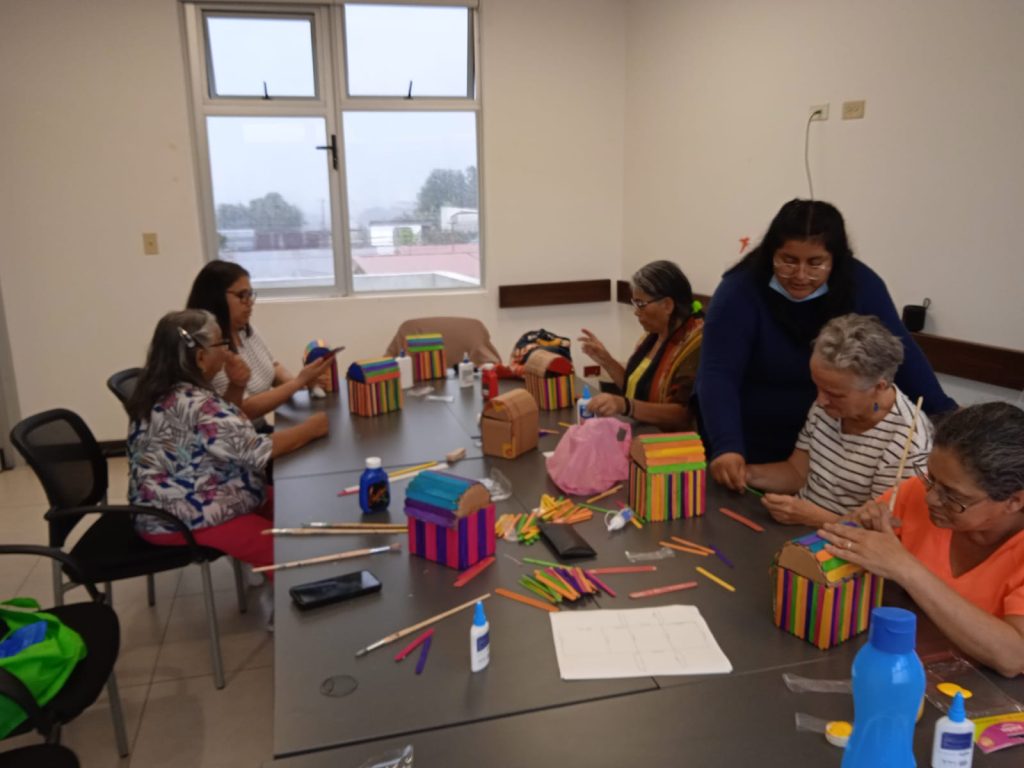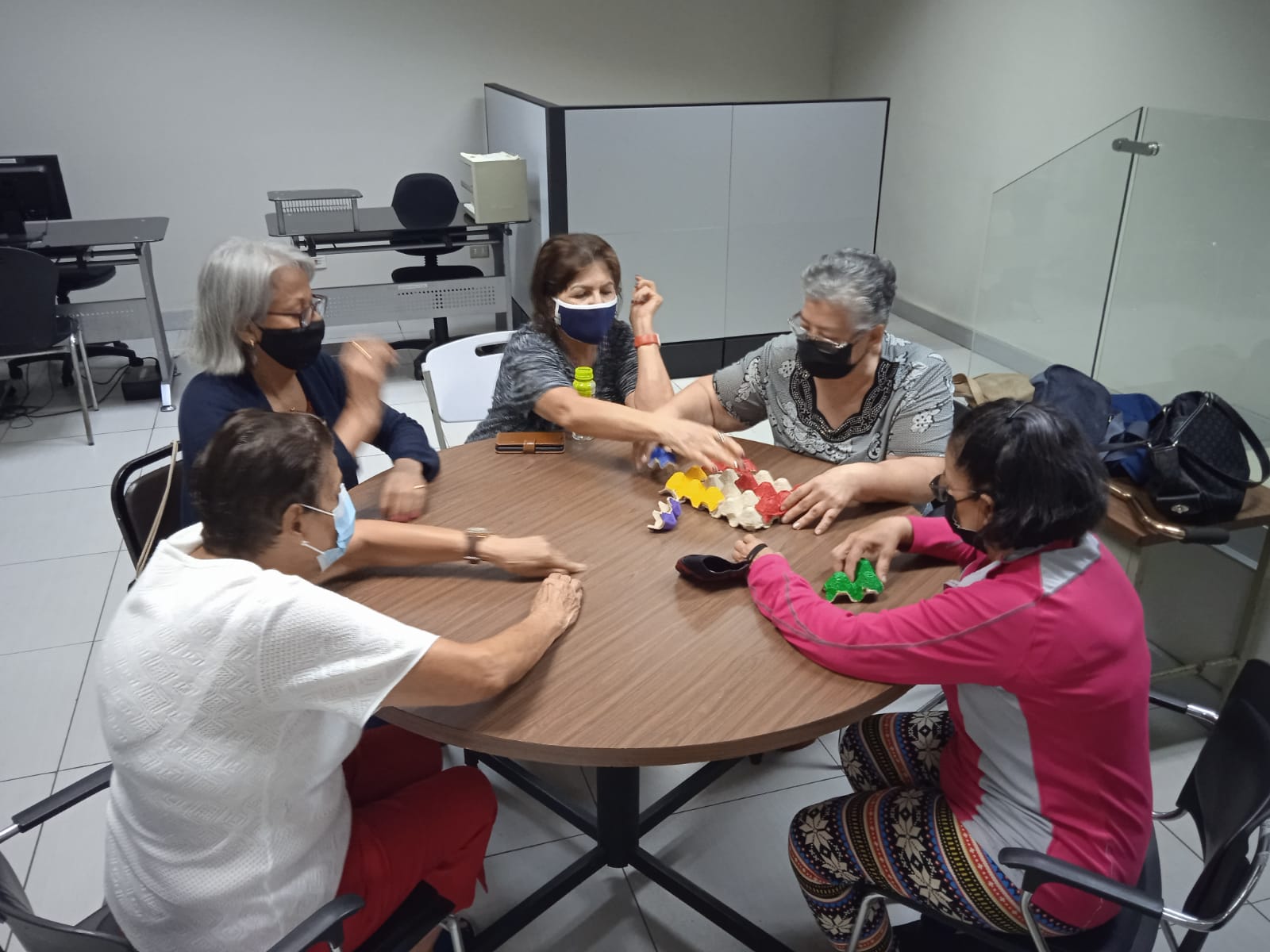“Mom, don’t do that. Mom, make sure you don’t fall down. Mom, you ok over there?”
Psychologist Giselle Chanto is trying to show me how one of several caregivers she’s interviewed at their homes in Curridabat, just east of San José, behaved during her multi-hour conversation with him. Like so many others, this man paid attention to Giselle and managed to sustain a rich and valuable conversation about his caregiving woes, but he never lost sight of his mother’s health and safety.
It’s precisely this commitment that, according to Giselle and others worried about caregivers’ mental health in Costa Rica, makes it so tricky to support this group. Unlike new parents, for example—who can attend a workshop with their babies in tow, or receive group childcare while they go to a support group or therapy session—many caregivers of senior citizens can rarely leave the house. And even when they receive support at home, they can’t easily put aside their duties to speak openly, in private, without distractions.
Beyond this, many caregivers just don’t consider their mental health a priority—leading to the deep concern Giselle and others feel for this heavily burdened, and growing, group in Costa Rica.
“Caregivers for older adults are often families, not someone hired from outside. ‘I take care of my mom, my dad, my uncle. I don’t even have the right to get frustrated,’” she says. “This leads to gastritis, colitis, migraine… We see people who are burned out, with physical symptoms, but they don’t even have time to make an appointment with their EBAIS [local health team] because they have to find someone to care for the senior citizen before they can care for themselves.
“These are conditions that are truly invisible,” she adds. “In this society, seniors are often made invisible. The people who care for them? Twice over.”
Why are municipalities so crucial in the effort to protect caregivers’ mental health—and how are they going about it? And how are municipal governments that are investing in the wellbeing of their cities’ senior citizens make a difference for the people who care for them?
A mental health crisis that can cause physical illness
It’s no surprise that the stresses of caregiving can have a negative impact on mental health—but did you know the impact is so severe that caregivers are actually used by researchers to study mental health challenges? A 2009 article on the mental health of family caregivers written by Richard Schulz and Paula R. Sherwood notes that “caregiving fits the formula for chronic stress so well that it is used as a model for studying the health effects of chronic stress.”
What’s more, the article points out that the older the caregiver, the higher the health risks for that person. In Costa Rica as around the world, the percentage of older caregivers is growing.
Those risks include “psychological distress, impaired health habits, physiologic responses, psychiatric illness, physical illness, and even death,” Schulz and Sherwood state. A CDC study of caregivers in the United States in 2015-2017 showed that “caregivers are at increased risk for having multiple chronic diseases as they may neglect their own personal health needs while providing care to others… 53.4% of caregivers aged 65 years and older have two or more chronic diseases.”
Municipal workers engaged with caregivers for the elderly have seen these trends in the field. Giselle says that she worked with one caregiver in her canton who was extremely ill but couldn’t find anyone, not even a sibling, who would fill in for her so she could get urgently needed treatment.
Verónica Hernández, of the Municipalidad of Cartago—which, like the Municipality of Curridabat, is one of Costa Rica’s leading local governments when it comes to initiatives that improve accessibility and wellbeing for the elderly—says that all these diverse physical and mental health challenges are worsened by a baseline problem that almost all caregivers for the elderly share: fatigue.
“Caregiving is exhausting,” she says. “When they’re full-time caregivers, the people who are the most tired are those who deal with senior citizens with significant limitations, those who are bedridden. That’s where you see cases of, ‘I’m tired. I just can’t do this anymore.’”
Even in less extreme cases, the solitude of caregiving takes its toll, as well as the personality conflicts and tensions that can take place.
“It’s not like you turn 65 and suddenly transform into this noble person,” says Giselle, with a wry smile. Despite our love for our parents, caregiving involves an intimate relationship between two complex and imperfect adults, and some conflict is bound to result.

For Verónica, when she counsels caregivers she meets through the municipality’s robust senior citizen programming, it’s personal. She draws on her own experience as a current caregiver for her 89-year-old mother to talk them through some of the interpersonal tensions they might experience. At a recent workshop for caregivers called “Me cuido para cuidar” (“I care for myself so I can care for others”), she said one woman talked about the conflict she’s been having with her parents, who don’t want her to accompany them to their medical appointments.
“I explained that you always have to respect their right to independence and autonomy, but also use certain tactics to work with them,” she said. “I used the example of my mom. She’s very active, but she has her limitations… I say to her, Mom, just go slow. It’s not that you can’t take a walk. Do it, but take it slow. It’s not that you can’t cook: do it, but take it slow.”
The simple act of venting, and exchanging ideas, with other caregivers can make a huge difference in caregivers’ state of mind, say the representatives from both municipalities.
However, it’s hard to even start to create those networks when it’s so hard to get a caregiver out of the house.

Bringing caregivers to the table
As we’ve reported since we launched our Mental Health Route in June, public access to mental health care is deficient on a national level because mental health has been traditionally neglected and overlooked. However, both Giselle and Verónica say that the biggest reason that caregivers often fail to receive mental health care—and physical health care—is a question of logistics. And that’s precisely why local governments, with their community infrastructure and knowledge of their residents, can play such an important role.
Verónica says that as the pandemic kicked in, the Municipality of Cartago reached out to caregivers through Teams and Zoom, but with low participation rates. Particularly when caregivers have limited economic resources, they might have a limited data plan that makes such sessions difficult. And sometimes “they’re busy caring for the person, so they just forget.”
Giselle had a similar experience. As the pandemic progressed, she started trying to get caregivers to come to the senior care centers the municipality has established, but found that they just can’t get away from home. So she started visiting them at home throughout the canton earlier this year.
“There was a community service project from the University of Costa Rica, and they mapped some of our caregivers,” she explains. “Based on those maps, I started making home visits to establish rapport, without any structured interview. How are you? How do you feel? I started to listen to their stories.”
Again and again, she found caregivers—usually related to the people they are caring for—who are burning out and experiencing fatigue, depression or anxiety because they have trouble setting limits or prioritizing their own needs. But while her fledgling efforts with about a dozen caregivers helped strengthen her resolve to develop more programming for this sector, it also showed her that doing so would require more hands. Without significant additional investment that would allow her to hire two more mental health professionals so she can arrange home visits to Curridabat residents more regularly, it’s hard to envision moving the needle in a significant way for the mental health of caregivers.
Giselle says that one key to increasing local governments’ attention to this issue is simply for caregivers—often an overwhelmed and therefore quiet group—and others to keep raising their voices.
“We’ve got to add pressure so that the municipality will say, ‘Oops! We’d better work on this,” she explains. “Municipalities, particularly Curridabat, do have the resources. We just have to keep emphasizing the need here.”
In the meantime, caregivers can access a variety of tools virtually or over the phone,
Verónica, in Cartago, says that caregivers that need help should first approach their local health team, or EBAIS, but that the Línea Dorada (“Golden Line”) phone line launched in September is another great resource for senior citizens, whether they’re carers or cared for. This inter-institutional effort by the National Council for Senior Citizens (CONAPAM), the public National Radio and Television System, and the Executive Branch offers a free 24-hour phone number, 1165, that seniors in need of help can call, particularly if they’re experiencing mistreatment or violence.
She says that perhaps the biggest challenge is getting caregivers to recognize that their own physical and mental health is worth the effort involved in asking for help. Too often, caregivers think that they’re simply doing their duty and have no right to complain.
But “you have to understand our societal frameworks. We’re talking about a patriarchal society where women are taught that we were born to care for others.”
Major shifts have to take place in order for women to say, in Giselle’s words: “Stop. I wasn’t born just to care for others. I have a life. I am a person… You have to set down limits and say, Mom, I love you, I’ll care for you, but I do need one day a week for myself.”
She urges people who care about this issue to contact their local municipality to find out what, if anything, is being done for caregivers in the area, to ensure that local leaders know their communities want to see progress. Even though the stories of Curridabat and Cartago show that providing meaningful support to caregivers for the elderly is deeply challenging, she says any amount of help will mean a lot to this group—for a sad reason.
“There’s so much that could be done for caregivers,” she says. “And since no one has done anything, they’ll greet anything they receive with so much warmth.”






